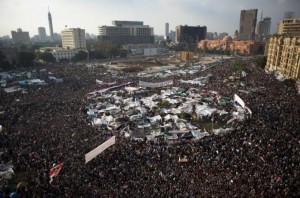Can Europe protect the Euromaidan?
February 3, 2014
German foreign policy perks up under new gov’t – Appeal
February 3, 2014As Egypt prepares for a constitutional referendum next week, protests by supporters of the Muslim Brotherhood continue to sweep the country. More clashes are expected today as the Brotherhood has called for new demonstrations. The decision to declare the Muslim Brotherhood to be a terrorist organisation, announced at the end of December, marks a further escalation of the authorities’ campaign against the group. Six months after the army deposed Egypt’s first freely elected president, the new authorities are keen to give the impression that the country is back on the path to democracy. But is this really the case? And how can Europe help Egypt in the coming months and years?
In a new ECFR policy memo – Egypt’s unsustainable crackdown – Anthony Dworkin and Hélène Michou argue that the authorities’ attempt to restore public order through repression will not succeed. Egypt cannot hope to establish a stable and democratic political order while trying to eradicate the Muslim Brotherhood as an organisation, and the attempt will only fuel increasing violence and disorder. The EU must recognise this fact and build a new policy towards Egypt on this basis.
Political dynamics in Egypt and the role of the Muslim Brotherhood
- Egypt is not moving towards meaningful democracy or stability. Instead, the country remains under the control of an army leadership that has overseen a harsh crackdown on the Muslim Brotherhood (MB) and now appears to be trying to exclude them permanently from the country’s political life.
- A new controversial constitution has been drafted and will be put to a referendum next week. Parliamentary and presidential elections are scheduled to follow later this year – but the repression of alternative voices will not result in a political solution that can overcome the country’s deep political and societal divisions.
- While there are uncertainties about the path that Egypt will follow it is clear that the country’s powerful security forces will have decisive influence over the future of Egypt. Against a background of popular intolerance and public media that strongly back the state, there is little prospect of the clampdown being lifted in the short term.
A long-term vision for European policy
- Europe needs to view Egypt in a longer-term perspective and craft a set of policies that are focused on the fundamental elements that will be necessary sooner or later for a truly stable political framework to emerge.
- The EU should emphasise that political stability, economic development, and security will only be possible if the Egyptian authorities pursue a different course that encompasses a political vision for reintegrating Egyptian society.
- The EU should avoid the temptation to buy into the interim authorities’ picture of “normalisation”. The EU should resist any policy that suggests a return to business as usual as long as the current security state vision is predominant.
“It’s tempting for the EU to accept Egyptian authorities’ actions at face value, but they are not likely to lead to stable politics or an improvement in security. Instead, the EU should keep its focus on the steps that will ultimately be necessary for Egypt to move forward.” Anthony Dworkin
“The EU is facing the considerable challenge of how best to support Egypt’s transition without unconditionally endorsing the road map set out by the interim authorities. As dissenting voices are squeezed out of the political sphere, Egypt’s political leadership must recognise that its future stability depends in large part on its ability to tackle structural causes of injustice and democratic deficits.” Hélène Michou


